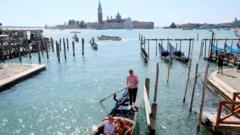The Beninese government emphasizes that this move aims to help "reconnect people of African descent globally with their historical, cultural, and spiritual roots." Enhancing heritage reclamation efforts, the nation has introduced multiple initiatives, including a law enacted last year that allows individuals with African ancestry, particularly those who were part of the transatlantic slave trade, to acquire citizenship. The announcement follows the establishment of a dedicated website to facilitate citizenship applications for descendants of enslaved Africans, with Tonya Lewis Lee among the first to receive a positive outcome from her application.
Spike Lee has expressed personal ties to Africa, revealing through DNA analysis that his lineage traces back to Cameroon and Sierra Leone. His wife’s specific ancestry details have not been publicly disclosed. Both Lee and Lewis Lee are celebrated advocates for social justice and civil rights in the U.S., with Spike Lee’s films reflecting themes of race and identity. The Beninese government recognizes their substantial influence on narratives concerning the African diaspora due to their unwavering commitment to justice and creative contributions.
Benin's coastline historically known as the Slave Coast, was pivotal in the transatlantic slave trade, with the Kingdom of Whydah estimated to have exported over a million Africans between 1580 and 1727, creating a legacy that Benin now seeks to address through these new cultural ties.
Spike Lee has expressed personal ties to Africa, revealing through DNA analysis that his lineage traces back to Cameroon and Sierra Leone. His wife’s specific ancestry details have not been publicly disclosed. Both Lee and Lewis Lee are celebrated advocates for social justice and civil rights in the U.S., with Spike Lee’s films reflecting themes of race and identity. The Beninese government recognizes their substantial influence on narratives concerning the African diaspora due to their unwavering commitment to justice and creative contributions.
Benin's coastline historically known as the Slave Coast, was pivotal in the transatlantic slave trade, with the Kingdom of Whydah estimated to have exported over a million Africans between 1580 and 1727, creating a legacy that Benin now seeks to address through these new cultural ties.



















